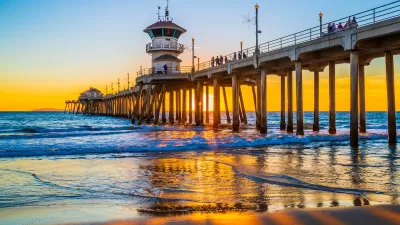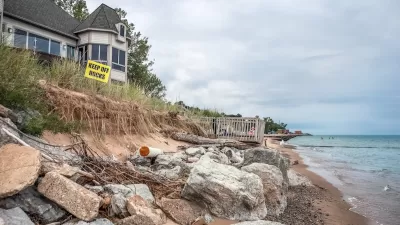Two new scientific papers report that global carbon dioxide emissions set a record high in 2011. With no coordinated effort underway to curb them, researchers believe crossing the 2 degree Celsius threshold for the worst impacts may be inevitable.
As delegates from nearly 200 nations meet in Doha, Qatar with a modest agenda of climate change discussions, Justin Gillis and John M. Broder report that "[e]missions continue to grow so rapidly that an international goal of limiting the ultimate warming of the planet to 3.6 degrees Fahrenheit, established three years ago, is on the verge of becoming unattainable, said researchers affiliated with the Global Carbon Project."
"Josep G. Canadell, a scientist in Australia who leads that tracking program, said Sunday in a statement that salvaging the goal, if it can be done at all, 'requires an immediate, large and sustained global mitigation effort.'" Yet as recent international gatherings have shown, the world's countries have little desire to agree to such efforts.
Although emissions in some developed coutries are falling, owing to "a combination of economic weakness, the transfer of some manufacturing to developing countries and conscious efforts to limit emissions," new figues show that, "the decline of emissions in the developed countries is more than matched by continued growth in developing countries like China and India."
If you need any more reason to be pessimistic about the fate of the planet, the Institute of Physics revealed last week that the seas are rising 60 percent faster than expected, reports Philip Bump.
FULL STORY: With Carbon Dioxide Emissions at Record High, Worries on How to Slow Warming

Alabama: Trump Terminates Settlements for Black Communities Harmed By Raw Sewage
Trump deemed the landmark civil rights agreement “illegal DEI and environmental justice policy.”

Planetizen Federal Action Tracker
A weekly monitor of how Trump’s orders and actions are impacting planners and planning in America.

Why Should We Subsidize Public Transportation?
Many public transit agencies face financial stress due to rising costs, declining fare revenue, and declining subsidies. Transit advocates must provide a strong business case for increasing public transit funding.

Understanding Road Diets
An explainer from Momentum highlights the advantages of reducing vehicle lanes in favor of more bike, transit, and pedestrian infrastructure.

New California Law Regulates Warehouse Pollution
A new law tightens building and emissions regulations for large distribution warehouses to mitigate air pollution and traffic in surrounding communities.

Phoenix Announces Opening Date for Light Rail Extension
The South Central extension will connect South Phoenix to downtown and other major hubs starting on June 7.
Urban Design for Planners 1: Software Tools
This six-course series explores essential urban design concepts using open source software and equips planners with the tools they need to participate fully in the urban design process.
Planning for Universal Design
Learn the tools for implementing Universal Design in planning regulations.
Caltrans
Smith Gee Studio
Institute for Housing and Urban Development Studies (IHS)
City of Grandview
Harvard GSD Executive Education
Toledo-Lucas County Plan Commissions
Salt Lake City
NYU Wagner Graduate School of Public Service





























